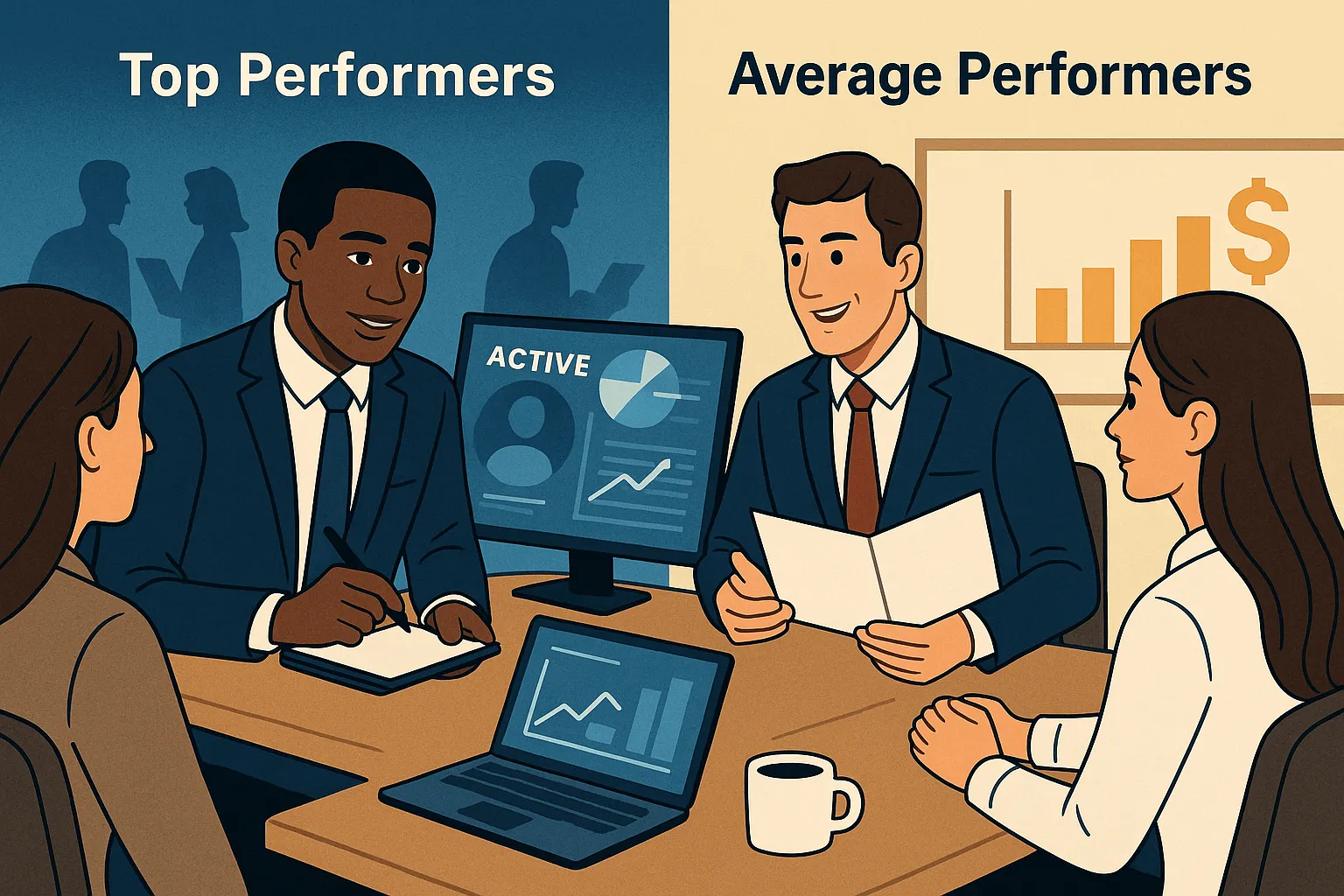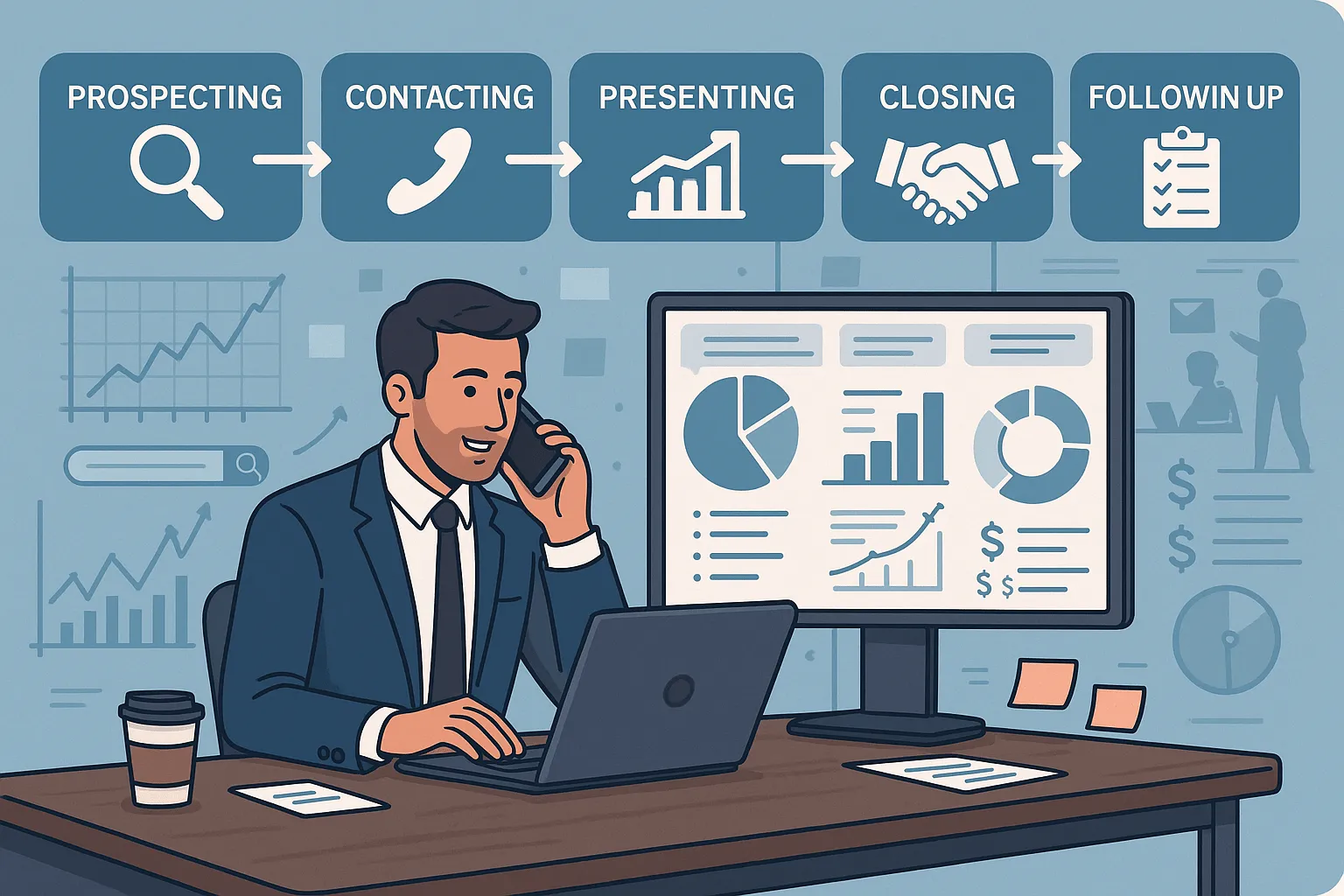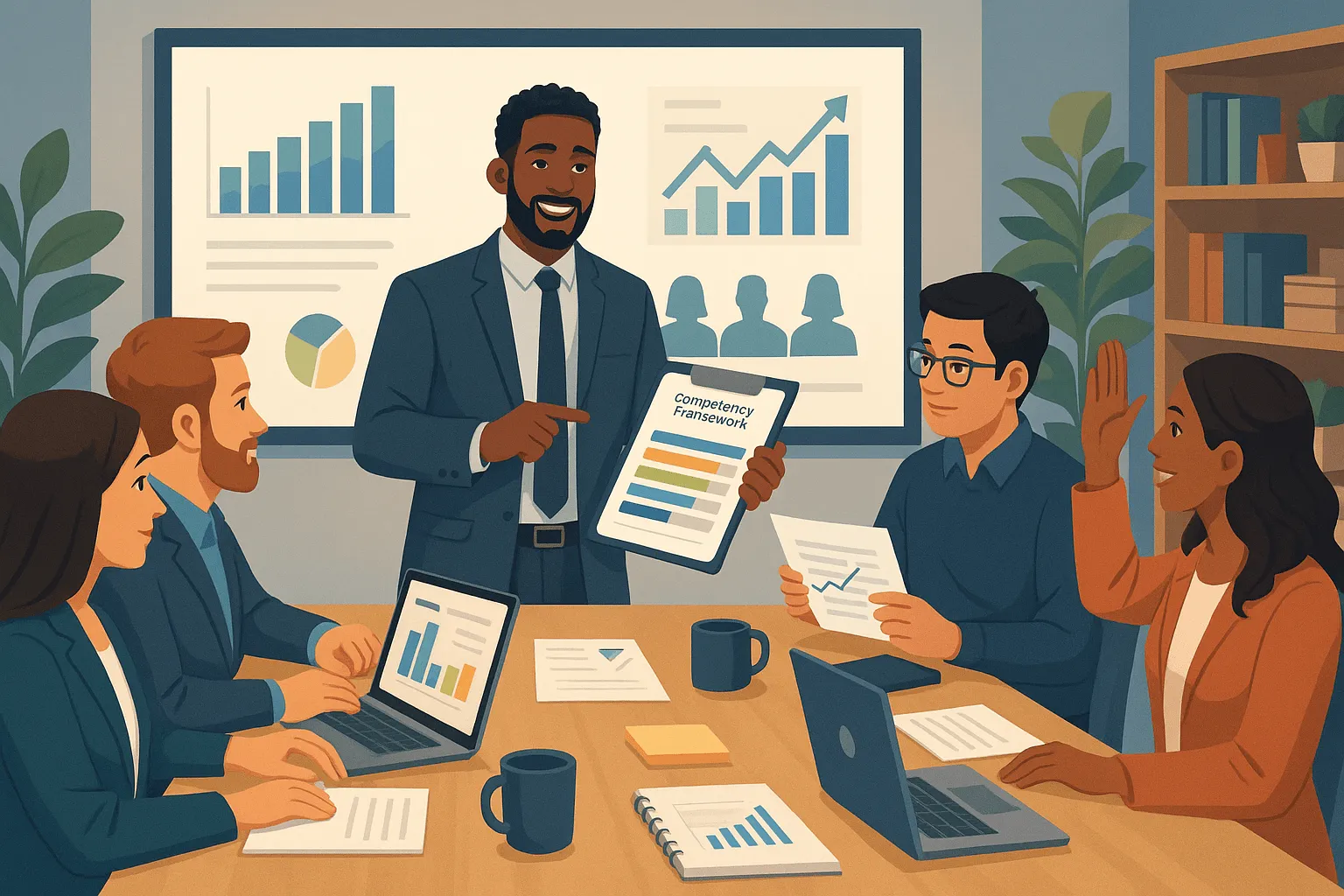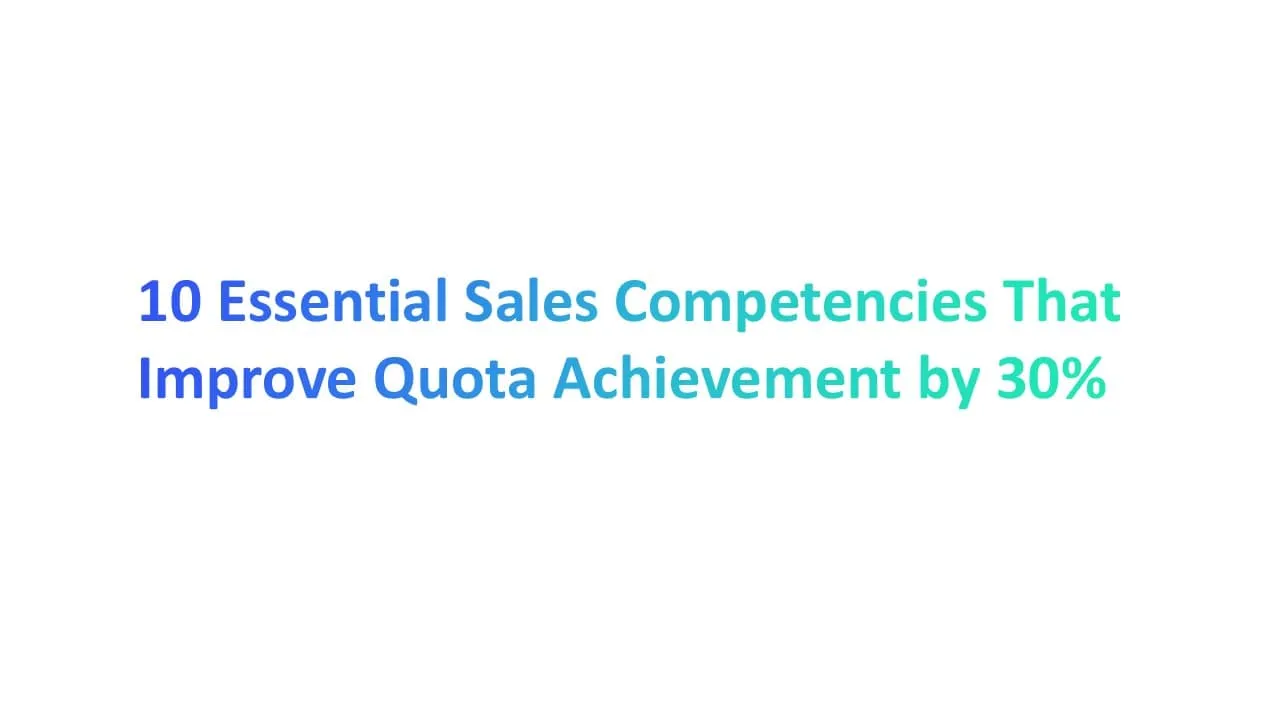Let’s be honest—hitting your sales quota isn’t about luck or coffee-fueled hustle. It’s about mastering the right sales competencies.
In fact, according to Harvard Business Review, companies with strong sales capabilities outperform their peers by 23% in revenue growth.
Whether you're a seasoned sales leader or a new rep trying to survive Q3, this guide breaks down the top competencies that actually move the needle.
Ready to stop guessing and start closing? Let’s dive in.
What Are Sales Competencies and Why Do They Matter?

Sales competencies are the skills and behaviors that help you succeed in your sales role. They go beyond just talking well. Why is sales competency important? Because it’s what separates average from great.
They include things like active listening, product knowledge, and knowing how to handle customer concerns during the buying process. Sales core competencies like prospecting and follow-up drive daily success.
Today, customers are smarter and expect more. You can’t rely on old-school sales tricks. You need to show real value, fast.
According to Salesforce, 73% of customers expect companies to understand their needs and expectations.
Why Sales Professionals Must Master Evolving Customer Expectations

If you're a sales professional, here’s why these competencies matter more than ever:
- Understand changing behavior: Buyers research before talking to you. You need strong industry insight and sales data to stay ahead. Marketing and industry insight helps align sales strategies with customer behavior.
- Build trust quickly: With great product knowledge and relationship building, you build confidence fast.
- Use the right tools: From sales training to technology expertise, top reps are always learning.
- Make smarter decisions: Strong sales competencies help you analyze customer needs and guide them better through the sales process.
When you build the right competencies, you’re not just selling—you’re helping. That’s how high-performing teams achieve success and boost customer satisfaction.
The Link Between Sales Competencies and Sales Performance

Strong sales competencies help sales teams do better work, faster. When reps know how to listen, ask the right questions, and use tools well, they close more deals. That’s called sales performance—and it improves with the right training.
Core Competencies That Separate Top Performers from the Rest

1. Active Listening to Understand Customer Concerns
Active listening is a vital skill for uncovering customer needs fast. Active listening means fully focusing on what your buyer is saying—without interrupting or jumping in too fast. It shows the customer that you care about their concerns, not just about closing the deal.
According to Forbes, 74% of buyers say they are more likely to buy from reps who listen actively and personalize their approach.
How to develop this competency:
- Don’t talk over the buyer. Let them finish.
- Ask simple questions to show you’re engaged.
- Repeat or summarize what they said to confirm understanding.
Sales reps who do this can uncover hidden pain points in the buying process using customer data and respond better. This improves sales performance and helps build lasting relationships.
2. Product Knowledge That Builds Trust and Confidence
Product knowledge means knowing your product inside-out. But it also means understanding how it solves real problems for your customers.
Customers trust reps who can explain how the product works in simple words. This is especially true for sales organizations that sell complex tools or services.
Here’s what great reps do:
- Know the product's features, benefits, and limits.
- Stay updated on product updates and industry insight.
- Use examples or stories to show how it helped existing accounts.
"Great reps don’t just pitch features—they connect solutions to customer needs." — Sandler Sales Institute
3. Industry Insight and Market Dynamics for Smarter Selling

Industry insight means knowing what’s happening in your market—who’s buying, what’s trending, and what’s changing. Market dynamics are the shifts that affect customer needs, like tech changes, laws, or the economy.
Top sales professionals stay ahead by watching the market. They don’t guess—they use data, real-time updates, and sales data to guide their next move.
How to develop it:
- Follow industry trends through blogs, news, and competitor updates.
- Use data analysis to spot what’s working and what’s not. Use market data to spot changing customer needs and improve outreach.
- Talk to sales managers or team members who work with different sales organizations.
4. Relationship Building and Account Management
Relationship building is about trust. Account management is taking care of those relationships long after the deal closes. You’re not just closing—you’re sticking around to help.
Customers buy from people they like. They stay with people they trust. Strong relationships increase customer satisfaction, sales productivity, and deal size.
How to build this competency:
- Be honest, even when it’s hard.
- Remember small things—names, challenges, wins.
- Check in often, not just when it’s time to sell.
“You don’t close a customer. You earn them—and keep earning them.” — U.S. Enterprise Account Director
5. Data Analysis and Sales Data Interpretation
Data analysis means looking at numbers and patterns to make smart decisions. In sales, it helps you know what’s working and what’s not. Sales data interpretation is when you take those numbers and figure out what they actually mean for your deals.
Top sales professionals don’t guess. They use sales data to track performance, spot weak points, and fix them fast.
According to Salesforce, high-performing teams are 1.5x more likely to use data-driven insights in every deal.
How to build this skill:
- Learn the basics of data analysis tools (like dashboards and reports)
- Ask your sales managers what data matters most (calls, conversion rates, average deal size)
- Use that data to make real changes in your day-to-day sales process
6. Sales Process Mastery from Prospecting to Closing

The sales process is the step-by-step journey from finding a new lead to signing the deal. Mastering it means you know what to do at each stage—without skipping or guessing. Without a clear sales process, you waste time, miss follow-ups, and lose deals.
Key stages to master:
- Prospecting: Finding people who might want what you sell
- Qualifying: Making sure they actually need it
- Pitching: Showing value, not just features
- Handling objections: Answering concerns honestly
- Closing: Asking clearly for the decision
- Top reps also know which communication channels—like email, phone, or LinkedIn—work best at each stage of the sales process.
- Following up: Staying in touch for cross selling or renewals
Understanding the Buyer’s Mindset: Why the Buying Process Matters
Great sales reps have a comprehensive understanding of both buyer and product. The buying process is the customer’s side of the sale. It’s what they think, feel, and do before saying yes. If you understand this, you can meet them where they are—not where you think they are.
Today’s buyers do a lot of research before talking to a rep. They expect foundational sales knowledge, not fluff.
How to align your sales approach:
- Learn what questions your buyers ask at each stage
- Build sales competencies like active listening to hear what they’re really saying
- Focus on relationship building instead of pitching
- Use the right tools, like CRMs, to follow the full buying process
7. Technology Expertise to Increase Sales Productivity
Technology expertise means knowing how to use sales tools like CRMs, automation software, and reporting dashboards. It’s not about being techy—it’s about being smart with the tools that make your job easier.
Teach fundamental knowledge first before introducing advanced selling tools. Today’s top sales professionals use tools to save time, track leads, and work faster. The right tech helps improve sales productivity, shorten the sales process, and improve sales effectiveness.
How to build this skill:
- Learn how your CRM works. Use it daily.
- Use sales data to track how many calls, emails, and deals you handle.
- Try automation tools to schedule emails, track opens, and send reminders.
- Ask your sales managers for tips on tech that top reps use.
Pro tip: Don’t fear the tools—master them. Tech won’t replace your job, but reps who use tech well will.
8. Cross-Selling and Upselling Within Existing Accounts

Cross-selling means suggesting extra products that go with what the buyer already purchased. Upselling means showing them a better version of what they’re considering.
It’s easier to sell more to someone who already trusts you. Top sales reps focus on existing accounts instead of chasing only new ones. That builds loyalty and boosts sales performance.
“A 5% increase in customer retention can lead to a 25–95% increase in profits.” – Bain & Company
How to do it well:
- Learn your product catalog and where items complement each other.
- Use product knowledge to make helpful suggestions—not pushy ones.
- Build strong relationships. Good account management is the key to future opportunities.
- Look at performance metrics and sales data to spot patterns in past deals.
Real-life tip: If your customer bought a basic plan, show them how the advanced one saves time or adds value. If they bought one item, suggest a bundle.
These competencies also help reps find and close new business opportunities.
9. Continuous Improvement Through Sales Training Programs
Top sales professionals focus on professional growth and don’t stop learning. They always look for ways to get better. That’s what continuous improvement means—learning, growing, and updating your skills all the time.
Continuous improvement is the habit of learning from every win and loss. Great sales reps take feedback seriously. They work on weak spots through sales training and coaching.
According to Sales Readiness Group, companies that invest in formal training programs see up to 50% higher sales performance. That’s a big jump.
How to do it:
- Use training programs regularly—not just once a year.
- Track performance metrics like close rates and response time.
- Teach soft skills like active listening and problem-solving.
- Review customer feedback to boost customer satisfaction.
Companies that want a high performing sales team must make learning part of their culture. Continuous learning helps teams build foundational sales knowledge and gain the sales skills they need to grow.
10. Adaptability and a Growth Mindset for Future Sales Success
Sales changes fast. New tech, new buyers, new trends. What worked yesterday may not work tomorrow. That’s why adaptability and a growth mindset are key sales competencies.
Adaptability means adjusting to change. A growth mindset means believing you can improve with effort. Together, they help salespeople succeed even when things get tough.
How to build this:
- Encourage open talk about what’s working—and what’s not.
- Teach reps to embrace mistakes and learn from them.
- Keep them updated on market dynamics and industry trends.
- Help teams deal with change management through small steps.
How Sales Managers and Sales Leaders Can Develop Sales Competencies Across Teams

1. Start with a Competency Framework
A competency framework is a list of key sales skills your team needs. It sets a clear standard for all sales reps. Helps new team members know what’s expected. Keeps sales organizations aligned.
Include competency mapping early in the hiring process to find the right fit. Also, include both soft skills like active listening and hard skills like using sales data or technology expertise.
2. Use Skill Gap Assessments
A quick check of what your team knows vs. what they need to learn. Shows where training programs are needed. Lets you match strengths to the sales process. Makes planning smarter and faster.
3. Build Continuous Training Programs
Sales training isn’t one-and-done It helps teams improve through continuous improvement and enhances sales performance over time. Use tools, videos, and group coaching. Focus on product knowledge, consultative selling, and account management.
4. Lead by Example
If you’re a leader, your behavior sets the tone. Show relationship building. Practice data analysis before making decisions. Use the same sales competencies you teach.
Sales managers must analyze data regularly to guide better team decisions.
5. Tie Development to Performance Metrics
How you track growth matters. Use performance metrics like lead response time, close rates, or average deal size. Reward learning, not just sales. This builds a high performing sales team—not just high closers.
6. Foster Peer Learning & Collaboration
Your best teachers might be your own sales professionals. Run lunch-and-learns. Encourage top sales reps to share what works. Make learning part of your sales culture.
The Role of Sales Leadership in Building a High-Performing Team

Sales leadership is more than managing numbers. It’s about creating a system where people consistently achieve.
Great leaders don’t just hire skills—they develop sales competencies every day.
If you want long-term sales success, start with your team. Grow their skills. Track results. And keep learning together.
FAQs
1. What are the 7 essential selling skills every sales person should know?
Sales professionals need core sales skills to succeed. The most important ones are:
- Active listening
- Product knowledge
- Relationship building
- Handling objections
- Consultative selling
- Time management
- Understanding the buying process
These are key skills and essential sales competencies that help reps close more sales and keep customers happy.
2. What are the core competencies of a sales manager?
Sales managers must guide sales reps and teams. Their core competencies include:
- Coaching and mentoring
- Analyzing sales data
- Driving team performance
- Using sales training programs
- Leading with empathy and clarity
They help build high performing sales teams that deliver results.
3. What are the four key competencies?
Top sales leaders focus on four areas:
- Sales process execution
- Data analysis and performance tracking
- Customer satisfaction through great service
- Sales leadership—leading by example
These help sales organizations grow faster.
4. What are examples of sales competencies in high-growth organizations?
Here are some examples:
- Strong technology expertise
- Deep industry insight
- Skilled in cross selling and managing existing accounts
- Understanding market dynamics
- Aligning with marketing for better sales effectiveness
High-growth firms invest in both sales productivity and training programs.
5. Are sales competencies the same for SDRs, AEs, and account managers?
Not exactly. Sales representatives must develop both soft and technical skills to meet quota
- SDRs focus on outreach and qualifying leads.
- AEs need skills in negotiation and product knowledge.
- Account managers must focus on customer satisfaction and long-term growth.
Still, all roles need a solid foundation in sales competencies to succeed and consistently achieve goals.
Conclusion
Sales competencies are the key to long-term success. To grow, sales teams must focus on essential skill-building, understand the full sales cycle, and keep improving core sales competencies. Investing in team members, professional development, and learning from closed lost deal patterns can drive real results. Start today to build a strong foundation for organizational success.







.webp)

